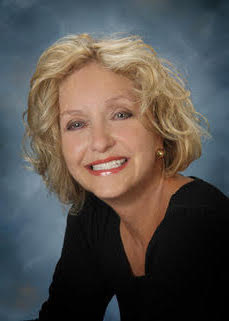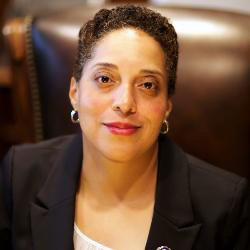Lawyer and author shares her holiday wishes for women lawyers

Susan Smith Blakely.
According to the U.S. Census Bureau, there are more than 400,000 women lawyers in America today, and women comprise more than 36% of practicing lawyers. Women are working at all levels of practice and in every specialty area. They are smart, competent, thorough, dedicated and much more. But that does not mean it is easy for any of them.
What have already been challenges for women lawyers for decades often became overwhelming obstacles in 2020. During the COVID-19 pandemic, women lawyers’ responsibilities expanded on the homefront during isolation with small children.
That home also became an office, and it frequently meant sharing a workspace with a spouse or partner. Women lawyers without caretaking responsibilities also found these changed realities to be confusing and anxiety-provoking. So this year, women lawyers are the focus of my holiday wishes.
For all women lawyers
The year 2020 has seen increased recognition for women lawyers in the judiciary, managing large law firms and being named in unprecedented numbers to President-elect Joe Biden’s cabinet. But women lawyers continue to face huge challenges in the practice of law.
Those challenges include gender discrimination and gender biases that can make every step in their career paths steeper than the last one. Fortunately, there are laws against gender discrimination, but implicit (unconscious) gender bias is typically more subtle and difficult to prove. It is also very destructive and career-limiting.
For unmarried women, implicit bias underlies the unproven assumption that they will marry and have children, which is interpreted to mean inevitable maternity leave and “disruption” of the workplace. And women with children are often presumed to lack dedication to lawyerly tasks and to be incapable of turning off “mommy brains” for long enough to function. Experienced women lawyers also suffer from implicit biases, which deny them pay equity and their fair shares of fee and generation credits.
But it does not stop there. Some women lawyers also fall victim to paternal gender bias, characterized by the perception that women lawyers returning from maternity leave are not ready for the heavy lift of the legal workplace. So these women can find themselves relegated to work that is not valued for purposes of promotion.
In that case, male lawyers think they are being sensitive to the needs of women. But they are not. They are exacerbating problems of unequal pay and lost opportunities for upward mobility.
So I wish for awareness, understanding and wisdom on the part of law firm leaders in addressing the unique needs of all women lawyers, especially those who are at the entry level and first experiencing the troubled waters of law practice. These leaders need to insist on a review of processes and practices in the areas of recruitment, promotion, work assignments and client generation with the goal of eliminating the effects of unconscious bias.
For the mommy lawyers
Being a mommy lawyer can be very complicated. These women are amazing, especially the ones who return to full-time work after maternity leave. For them, being “Mommy” at home and “lawyer” at the office requires two completely different skill sets. And they must be able to separate those two facets of themselves in order to be successful at both.
It is why I so often hear women lawyers lament that they do not feel like either good enough mothers or good enough lawyers. It is because they are trying to do it all perfectly and keep multiple balls in the air.
Think about the rare but unforgettable women lawyers who continue to sit for the bar exam after they have unexpectedly gone into labor. It was recently announced in the national media that one of those women, Chicagoan Brianna Hill, finished the first day of the essay portion of the October bar exam while in labor. After her baby was born, she finished the second day of essays from her hospital bed. Hill found out in early December that she had passed the bar exam.
Hill said, “I did all of this because I did not see any other option to accomplish both my goals—become a lawyer and a mom.” Amazing, simply amazing.
For those of you who are not mommy lawyers and think it cannot be any more difficult than what you are experiencing on a daily basis, consider this: Every day—and every night—is different for mothers of small children, especially mothers of infants. Anyone who has ever done it knows that Mommy only sleeps when baby sleeps. If baby has a bad night, Mommy has a bad night and a bad next day.
Add to that the anxiety created by caring for a newborn during a pandemic, and for some, the demanding schedule of a nursing mother—all bets are off. And once mommy lawyers of infants return to work, losing a nanny can be catastrophic.
Good nannies and quality child care are hard to find, especially during COVID-19, when additional health and wellness safeguards are so important. So mommy lawyers need to add “managing good relationship with nanny” to their task lists. It is just one more thing to master.
When babies become toddlers and then school-age, the mommy responsibilities expand exponentially. Keeping up with after-school activities and homework can be deal-breakers, and virtual school during a pandemic, coupled with the distractions from work concentration that are typical with small children, can turn practicing law into a complete nightmare. Every time I listen to a podcast or a webinar during COVID-19 featuring mommy lawyers, I am in awe at how they handle those responsibilities with such grace.
Many of us are familiar with these work-life issues. Being on maternity leave and having partners call me with the same lead-in every time—“Is this a good time to talk?”—comes to my mind. It was nice that they asked, but no time was a good time in those days. That was long before computers and e-mail, so there was little opportunity to respond at a more convenient time or set boundaries.
And the pattern continued when I returned to work on a flexible schedule. My worst memory from those days involved arguing a telephonic motion before a federal judge who did not care what days I worked at the office when scheduling hearings. I later discovered that I was the first woman lawyer to practice in his courtroom, so I probably could not have expected more. It was the early 1980s, and women lawyers in federal courts in South Carolina were an endangered species.
On the day of the hearing, my children’s nanny was unavailable. As I tried to keep my composure, argue persuasively and cite my authorities effectively, my children, ages 2 and 4, discovered the Christmas ornaments and paraded them before me with squeals of joy so I could share in their delight and their mischief.
First came the snowman with no head, followed by the angel with no wings, and then Santa missing body parts. And more. I am proud to say I won that motion, and I did not mention those stressful circumstances at the office. No one cared.
So as we head into the new year, perhaps the first thing I wish for the mommy lawyers is extra sleep during the holidays, a time when they can hand off baby and any small children to family members and catch up on slumber. That might be harder during the pandemic, when helpful “visiting relatives” seems like an archaic concept, but some variation of traditional holiday observations should allow for much-needed naptime for mommy lawyers.
Next, both now and into the future, I wish for schedule flexibility and remote working that is respected by colleagues and supervisors—and, yes, opposing counsel and members of the judiciary as well. It does not make sense to punish women lawyers for their desire to have children, and in this 21st century, we ought to be able to do better than “In my day … ”
A recent survey reported how important the opportunity for flexibility is to women with child care and family responsibilities, and it also addressed which perks keep women in jobs that do not meet all of their aspirational needs. Although the survey was not particular to lawyers, the results are consistent with what you might expect to hear from women in the law profession: Flexibility, flexibility, flexibility.
For senior women lawyers
The biggest challenge for women lawyers is often other women lawyers, especially very senior women lawyers. Those women, many of whom did not have the benefits of maternity leave, flexible schedules and remote working opportunities, often consider today’s young women soft and unworthy.
These senior women made it to the boys’ club the hard way, and some of them will not let the young women forget it. They often are referred to as “Queen Bees,” and they have become real obstacles to the career advancement of young women lawyers.
When former Secretary of State Madeleine Albright said, “There is a special place reserved in hell for women who do not help other women,” she was not specifically referring to women lawyers, but she might as well have been. I once spoke to her about this, and she acknowledged the workplace challenges of her own three daughters, one of them a lawyer. She totally understood how her words apply to women in our profession.
For the Queen Bees, I wish an epiphany for each one. There is no place for their brand of implicit bias and negative leadership in our profession. It is time for all women in leadership positions to embrace what progress has been made for women lawyers and demand more of it.
We need to be able to count on senior women lawyers to be the champions and leaders of these culture changes. So many of them have focused on empathy, compassion, understanding, nurturing and decency within their families and social circles, and now it is time for them to turn those same talents to their profession. I hope they will make New Year’s resolutions to be better, do better and keep those promises.
Finally, I wish for the best for all women lawyers this holiday season, because in my experience, they are the best. They just need some of the obstacles removed to prove it.
Susan Smith Blakely is a former partner, law career counselor and author of the Best Friends at the Bar book series for female lawyers. Her most recent book is What Millennial Lawyers Want: A Bridge from the Past to the Future of Law Practice.



